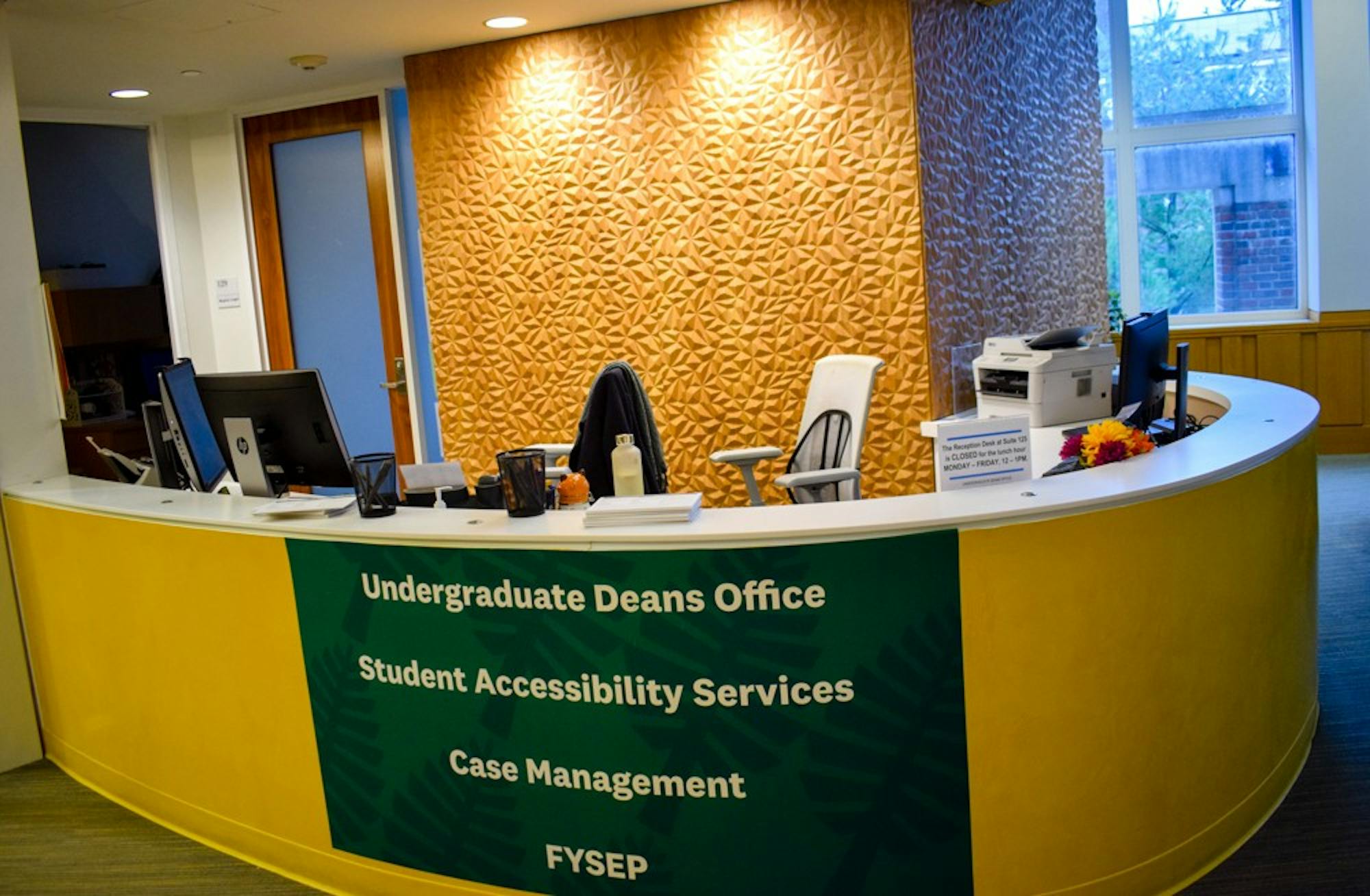Normally, when I work as a campus tour guide, everything goes smoothly. Worst-case scenario, I run a little over time or get asked a question about a “controversial” topic like student alcohol consumption, but nothing I’m not equipped to handle.
One time, though, something a little unusual happened during a tour. I was passing through Berry Library, where I usually speak briefly about the Undergraduate Deans’ Office, Student Center for Research, Writing, and Information Technology, and Student Accessibility Services. When I got to the part about SAS, I explained how students with disabilities or other conditions that warrant the use of accommodations can submit documentation in order to get the services they need.
Then, before I could even ask if anyone had any questions, I was interrupted by someone who had walked over to my tour group. He must have been around my age, possibly a current Dartmouth student, but I had never seen him before. I hadn’t seen him approach, but he clearly had something to say.
He asked me, a tinge of frustration in his voice: “What happens when someone submits fake documents?”
I was taken aback a bit, not only by the question, but also because I had to keep my cool in front of my tour group, who could clearly tell that I was caught off guard. I panicked internally for a second before taking a deep breath, and then responded: “I’m not incredibly familiar with SAS, but I’m sure they have some kind of protocol for verifying documents.”
He didn’t seem very satisfied, even pushing the question a little further, and I didn’t blame him — in retrospect, I couldn’t have sounded any more scripted if I tried. But the reality was, it wasn’t a question I had ever considered before. Sure, I’d heard stories about how some people “didn’t really need” their Adderall prescription but just convinced their doctors to sign off on the forms, but I’d never thought that was any of my business. I considered myself lucky to not need any kind of academic accommodations, and I never had anything against those who did. I wasn’t naïve enough to think that submitting fake documents never happens, but even if it did every now and then, I didn’t think it could be a big enough deal for me to care.
I continued the tour, trying not to show how frazzled I was, but that moment stuck with me. Whoever had interrupted the tour, he clearly had strong feelings about the topic, as if he had been personally affected by someone’s falsified requests for accommodations. Did he know something I didn’t? Was it really that easy to fake something so serious?
As it turns out, requesting accommodations through SAS isn’t always a simple — or quick — process. Alicia Brandon, SAS associate director, and Hillary Gregory, SAS office manager, explained in a joint interview that they have to “do their homework” when it comes to verifying documents. If something seems amiss, they investigate.
“We do call practitioners,” Brandon said. “It can actually slow down the approval process because we will say, ‘We have to talk to a practitioner further.’ If the student hasn’t signed a release of information [form] with their practitioner, the practitioner won’t talk to us because their practitioner is under a HIPAA oath.”
Gregory added that one specific reason why SAS might have to follow up on a diagnosis is when a document doesn’t list a specific duration of time for which services should be available.
Brandon said she understands that the process can feel stressful for students, particularly when they don’t understand why they have to renew their documentation. She emphasized that, in the end, everything SAS does depends on what the practitioner writes and says, and when they need more information and evidence, they have to wait for it. In some scenarios, such as when there’s a time difference between Hanover and a practitioner’s office, the delay can be significant.
Paperwork isn’t the only obstacle standing in the way of a student receiving the accommodations they need. Finances also have to be considered, and certain tests and evaluations can be costly: According to the SAS website, the range of neuropsychological assessments cost in the Upper Valley was $1,600 to $2,400 in 2013, while a clinical education program alternative (in which training doctoral-level psychology students perform supervised assessments) stated to be around $600. Not all health insurance providers cover those fees, and others cover them via reimbursement — meaning a student would need to be able to pay the initial costs upfront. If a student has to save up to afford upfront fees, that creates another kind of delay.
According to Gregory and Brandon, in addition to the discrepancy between the students who have the “ready funds” for those evaluations and those who don’t, there are also students who feel nervous about discussing the possibility of testing with their parents. Some students even look into ways they can afford the testing without insurance so that their parents wouldn’t find out.
Even when students finally receive approval for academic accommodations, they may have to face even more challenges. Rebecca Luo ’20 first became familiar with SAS her freshman year as a student notetaker, a job for which she would email copies of her notes to another student in the class receiving academic accommodations. Starting around her sophomore spring, however, she became the recipient of academic accommodations as a result of a physical condition diagnosis.
As part of her accommodations, Luo said she was given an Echo Smartpen produced by the company Livescribe. The smartpen works both as a pen and as a recorder, allowing users to record a lecture while writing down notes. Then, after class, students can go back to their notes and tap the pen to a specific section to hear a recording of what the professor was saying in that exact moment. For Luo, the smartpen was an important resource, as she would sometimes have to leave the classroom unexpectedly in the middle of a lecture due to her physical condition.
Luo explained that she wasn’t even aware the smartpen existed before meeting with SAS to discuss her options, and from that point, most of her interactions with professors about accommodations were positive. She said that SAS also provided letters to her professors on her behalf, and a few professors wanted to meet with her privately just to go over exactly what the accommodations entailed.
However, Luo said she did have one particularly negative experience with a professor who objected to the use of the smartpen in class. Luo acknowledged that prior to receiving the pen, she had been told by SAS that not all professors felt comfortable allowing recordings in class — for instance, when the class discussions involved students’ personal beliefs about controversial or sensitive issues. This professor’s objections, however, were for different reasons.
“[The professor’s] concern was that I would spread the audio files around in my class so that people wouldn’t show up to lecture,” Luo said. “[The professor] also gave a lot of pushback when I couldn’t make it to exams or I needed an extension on deadlines.”
After that experience, Luo stopped asking professors for accommodations, and mentioned that this term, she just never picked up her smartpen. Despite her previous positive experiences with other professors, she said that she didn’t want to deal with the potential for that kind of judgment again.
“I think [the professor] was kind of telling me that I wasn’t trying hard enough or I just wasn’t studying effectively enough,” Luo said. “I feel like [the professor] didn’t really understand that I had medical issues that stood in the way of me performing as well as I normally would.”
That viewpoint is, unfortunately, a common one, both on and off campus. Luo mentioned that those accusations can be even more strongly targeted toward people with mental disabilities or conditions, as opposed to her physical one.
Brandon and Gregory, for their part, said that they tell students and professors to contact SAS if they have any concerns and are happy to reach out to professors individually to learn where their concerns are coming from.
It doesn’t help that some students do try to abuse the system and find ways to receive accommodations they don’t need, however. Luo explained how, after mentioning her experience receiving accommodations on the Dental Admission Test in a pre-dental Facebook group, she received multiple messages from strangers about how to fake a doctor’s letter. One person even asked how the American Dental Association would check if the letter was from a real doctor or not.
Brandon said she feels strongly about how those kinds of attitudes can be damaging to students who really have functional limitations. She said that there’s already a strong stigma associated with having those limitations, not to mention the extra steps those students have to go through just for equitable access.
Brandon recalled one student who compared giving their accommodation form to a new set of professors each term to coming out every single term. She said she believes that the stigma around accommodations is something everyone should be upset about, and that people should be able to be open — and even have disability pride, if that’s something they want. She is especially excited to see two different student groups, Access Dartmouth and the Autoimmune Campus Alliance, focusing on accessibility-related issues.
“I see disability as an aspect of diversity,” Brandon said. “Disability is intersectional, it can happen to anyone at any time of their life … You just don’t know when and who it’s going to strike, and it affects all sectors of populations. The lack of understanding perpetuates the stigmatization.”




